Anti-detect browser is a special type that transfers your data to the websites in a modified form. Such browsers send a completely different set of parameters about your device and location to the website (browser version, IP, language and much more). This artificially generated data set is called a browser fingerprint.
Thus, the service helps you remain anonymous and bypass some restrictions on ad platforms linked to account authenticity. As a rule, these tools are helpful when dealing with Facebook and other advertising platforms.
The technical side of anti-detect browsers involves a strategic combination of leveraging existing browser technologies and implementing additional tools to enhance anonymity and manipulate digital identities. These browsers typically use the underlying technologies of popular browsers such as Chromium or Firefox as a base. By integrating with these browsers, anti-detect browsers inherit core functionalities, compatibility, and security features while incorporating additional tools for anonymity and identity manipulation.
These additional tools include WebRTC and IP handling mechanisms to prevent potential IP leaks, User-Agent spoofing for mimicking different browser types and versions, and measures to counter canvas fingerprinting, a technique used to uniquely identify users based on how their browser renders graphics. Anti-detect browsers also provide enhanced control over browser extensions and plugins, allowing users to manage their installed components and reduce fingerprint uniqueness.
Anti-detect-browser meaning define principles of how anti-detect browsers operate:
These functionalities empower affiliates to control their digital identity and ensure online privacy.
On the market, you can choose from a multitude of anti-detect browsers.
We’ve curated trusted solutions worth trying:
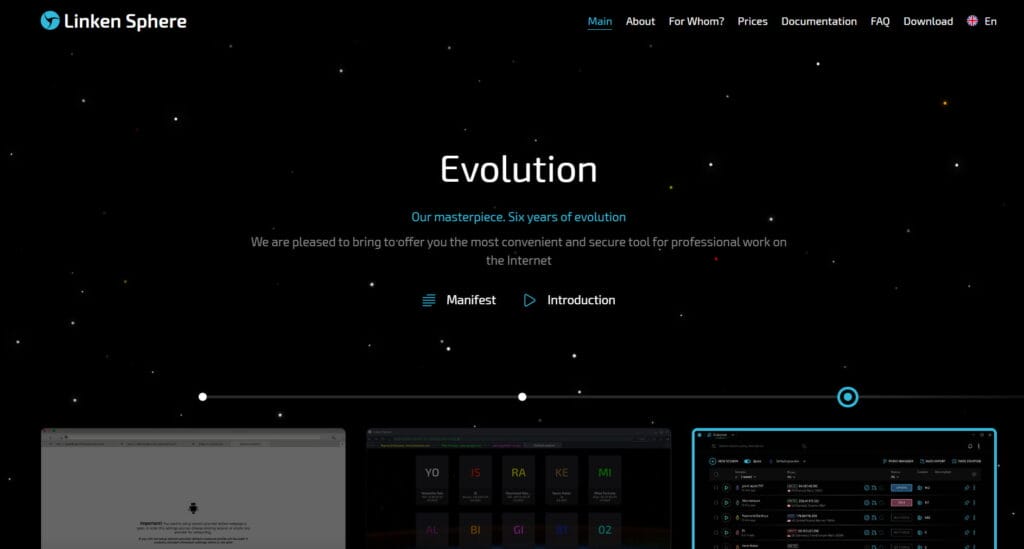
Linken Sphere started its platform in 2017, discovering many affiliates masking fingerprints and smooth multi-accounting. Their introduction marked a significant shift in how affiliate marketers approached online advertising. It was something new and revolutionary in affiliate marketing. The team adhered to the same philosophy while creating their new product – Linken Sphere Evolution 9.
Linken Sphere 9 Evolution is the result of fruitful collaboration between the original creators of the product and new developers who have brought fresh perspectives to the software. Combining 6 years of experience and users’ feedback, they created the simple-to-use innovative anti-detect browser.
Pricing: Pure – $30/month for 10 sessions, Light – $100/month for 100 sessions, Pro – $200/month for 300 sessions, Premium – $400/month for 1000 sessions and more.
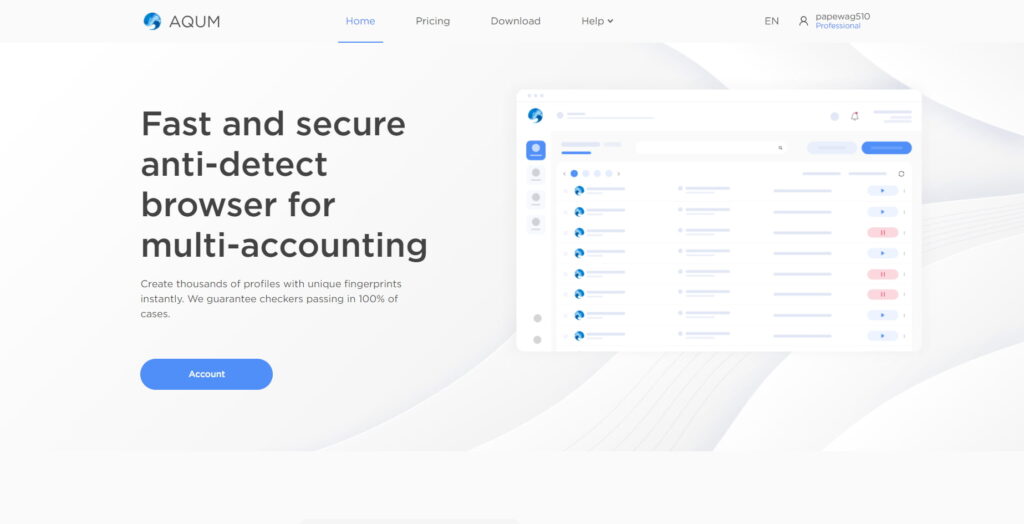
Aqum is a new anti-detect browser that recently hit the market. It’s based on the Chromium core and uses real data to fake fingerprints, ensuring a smooth passage through checkers like Pixelscan and BrowserLeaks. Affiliates can be sure that user data remain anonymous – browser profiles are encrypted in the cloud. The software is available for download on Windows, macOS, Android, and iOS.
The development team has been actively updating the platform, adding new features, and making improvements since its launch to compete with the top solutions in the market. It’s the AQUM community that fuels the platform growth at a rapid pace. Thanks to the community feedback, many updates on the platform have emerged.
Pricing: Starter – $19,99, Personal – $59,99, Team – $159,99, Professional – $299,99, Custom – $399+.
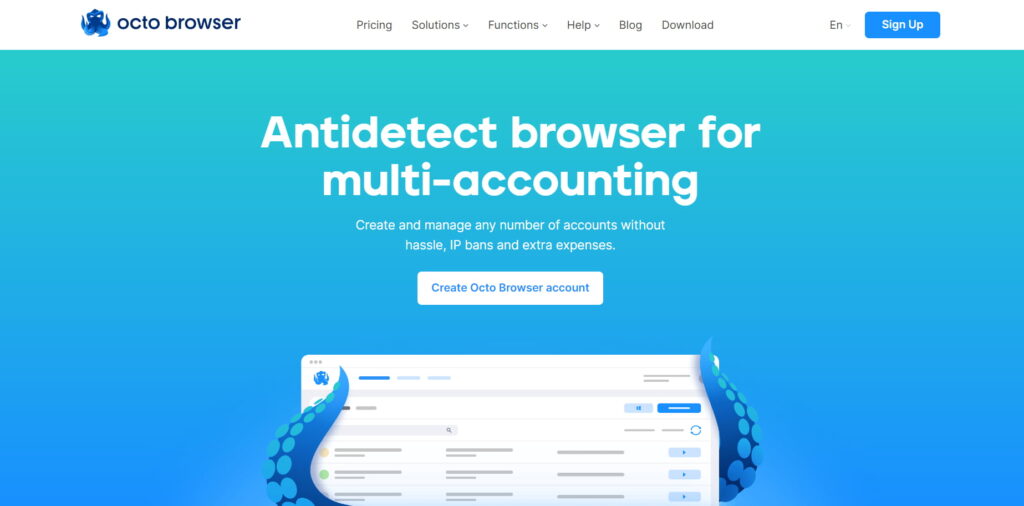
Octo Browser is a renowned anti-detect software operating based on the Chromium browser kernel. It combines features necessary for many business players: sellers, media buyers, digital agencies, bookmakers and crypto traders. Using Octo Browser for affiliate marketing, you can create accounts for common traffic sources: Facebook, TikTok and Google. Data about profiles is stored in the cloud in an encrypted format.
All provided accounts have a unique fingerprint, passing checkers such as Pixelscan, BrowserLeaks, Whoer, CreepJS and IP-API. Supported platforms include Windows, MacOS and LinuxBeta.
Pricing: Starter – €29, Base – €79, Team – €169, Advanced – €329, Custom – €429.
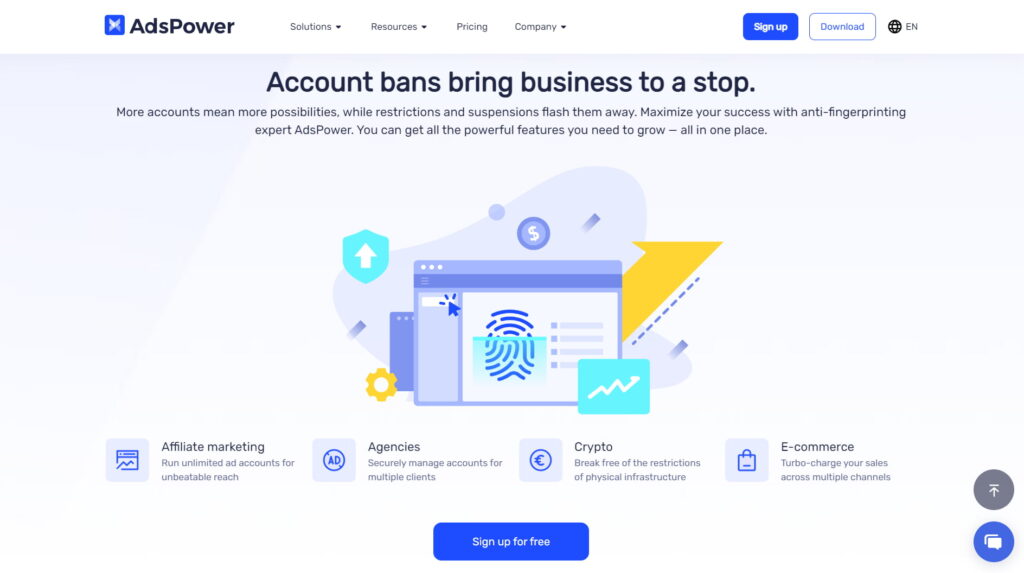
AdsPower is a Chinese company that launched anti-detect browsers based on both Firefox and Chromium – SunBrowser and FlowerBrowser (beta), accordingly. In 2022, their SunBrowser was named the top stealth browser in Asia. By now, developers are already gaining a reputation in the European countries. The service has competitive solutions for affiliates, e-commerce marketers, merchants, bettors, crypto enthusiasts, digital agencies, advertisers and much more.
Fingerprints can be customized for Windows, macOS, Linux, Android and iOS. The profile data is encrypted at the transmission and server levels, ensuring enhanced security.
Pricing: Base – from $9, Pro – $50, Сustom – (on request).
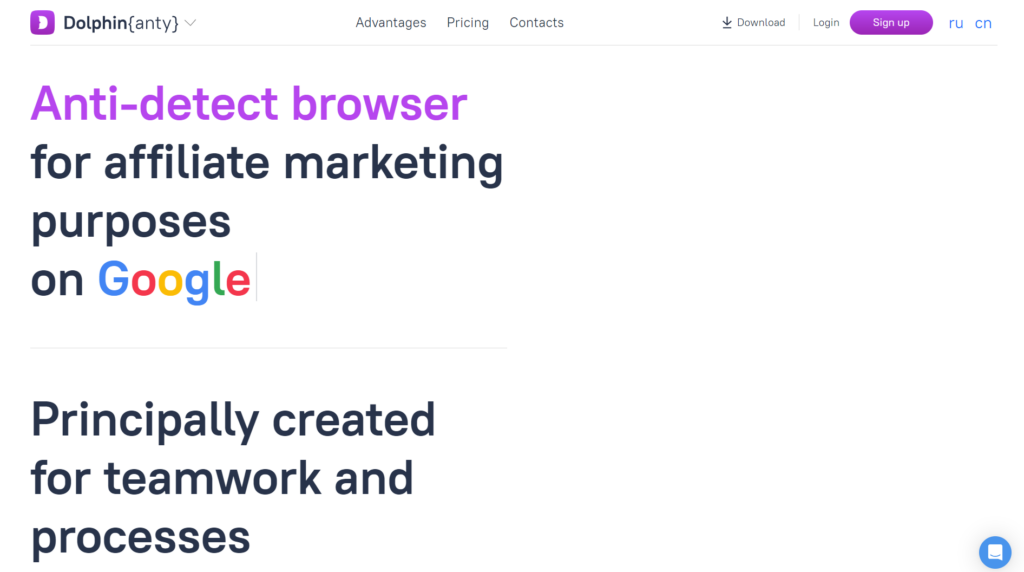
Dolphin Anty, an anti-detect browser built on its own kernel, is specifically designed to cater to the needs of affiliate marketers, especially team members. The tool also comes in handy for earning in crypto, betting and gambling. According to developers, users can save over 5 hours for launching 50 accounts, which significantly reduces marketing effort. Currently, the solution offers a secure method to set up accounts for Google and Facebook. Its next update promises to introduce TikTok integration.
The browser is versatile, with compatibility across various operating systems including Windows, Linux, macOS and macOS (M1). Additionally, the service is integrated with the popular trackers: Keitaro and Binom.
Pricing: Base – $89, Team – $159, Enterprise – from $299.
Anti-detect browser is a special type that transfers your data to the websites in a modified form. Such browsers send a completely different set of parameters about your device and location to the website (browser version, IP, language and much more). This artificially generated data set is called a browser fingerprint.
Thus, the service helps you remain anonymous and bypass some restrictions on ad platforms linked to account authenticity. As a rule, these tools are helpful when dealing with Facebook and other advertising platforms.
The technical side of anti-detect browsers involves a strategic combination of leveraging existing browser technologies and implementing additional tools to enhance anonymity and manipulate digital identities. These browsers typically use the underlying technologies of popular browsers such as Chromium or Firefox as a base. By integrating with these browsers, anti-detect browsers inherit core functionalities, compatibility, and security features while incorporating additional tools for anonymity and identity manipulation.
These additional tools include WebRTC and IP handling mechanisms to prevent potential IP leaks, User-Agent spoofing for mimicking different browser types and versions, and measures to counter canvas fingerprinting, a technique used to uniquely identify users based on how their browser renders graphics. Anti-detect browsers also provide enhanced control over browser extensions and plugins, allowing users to manage their installed components and reduce fingerprint uniqueness.
Anti-detect-browser meaning define principles of how anti-detect browsers operate:
These functionalities empower affiliates to control their digital identity and ensure online privacy.
On the market, you can choose from a multitude of anti-detect browsers.
We’ve curated trusted solutions worth trying:

Linken Sphere started its platform in 2017, discovering many affiliates masking fingerprints and smooth multi-accounting. Their introduction marked a significant shift in how affiliate marketers approached online advertising. It was something new and revolutionary in affiliate marketing. The team adhered to the same philosophy while creating their new product – Linken Sphere Evolution 9.
Linken Sphere 9 Evolution is the result of fruitful collaboration between the original creators of the product and new developers who have brought fresh perspectives to the software. Combining 6 years of experience and users’ feedback, they created the simple-to-use innovative anti-detect browser.
Pricing: Pure – $30/month for 10 sessions, Light – $100/month for 100 sessions, Pro – $200/month for 300 sessions, Premium – $400/month for 1000 sessions and more.

Aqum is a new anti-detect browser that recently hit the market. It’s based on the Chromium core and uses real data to fake fingerprints, ensuring a smooth passage through checkers like Pixelscan and BrowserLeaks. Affiliates can be sure that user data remain anonymous – browser profiles are encrypted in the cloud. The software is available for download on Windows, macOS, Android, and iOS.
The development team has been actively updating the platform, adding new features, and making improvements since its launch to compete with the top solutions in the market. It’s the AQUM community that fuels the platform growth at a rapid pace. Thanks to the community feedback, many updates on the platform have emerged.
Pricing: Starter – $19,99, Personal – $59,99, Team – $159,99, Professional – $299,99, Custom – $399+.

Octo Browser is a renowned anti-detect software operating based on the Chromium browser kernel. It combines features necessary for many business players: sellers, media buyers, digital agencies, bookmakers and crypto traders. Using Octo Browser for affiliate marketing, you can create accounts for common traffic sources: Facebook, TikTok and Google. Data about profiles is stored in the cloud in an encrypted format.
All provided accounts have a unique fingerprint, passing checkers such as Pixelscan, BrowserLeaks, Whoer, CreepJS and IP-API. Supported platforms include Windows, MacOS and LinuxBeta.
Pricing: Starter – €29, Base – €79, Team – €169, Advanced – €329, Custom – €429.

AdsPower is a Chinese company that launched anti-detect browsers based on both Firefox and Chromium – SunBrowser and FlowerBrowser (beta), accordingly. In 2022, their SunBrowser was named the top stealth browser in Asia. By now, developers are already gaining a reputation in the European countries. The service has competitive solutions for affiliates, e-commerce marketers, merchants, bettors, crypto enthusiasts, digital agencies, advertisers and much more.
Fingerprints can be customized for Windows, macOS, Linux, Android and iOS. The profile data is encrypted at the transmission and server levels, ensuring enhanced security.
Pricing: Base – from $9, Pro – $50, Сustom – (on request).

Dolphin Anty, an anti-detect browser built on its own kernel, is specifically designed to cater to the needs of affiliate marketers, especially team members. The tool also comes in handy for earning in crypto, betting and gambling. According to developers, users can save over 5 hours for launching 50 accounts, which significantly reduces marketing effort. Currently, the solution offers a secure method to set up accounts for Google and Facebook. Its next update promises to introduce TikTok integration.
The browser is versatile, with compatibility across various operating systems including Windows, Linux, macOS and macOS (M1). Additionally, the service is integrated with the popular trackers: Keitaro and Binom.
Pricing: Base – $89, Team – $159, Enterprise – from $299.